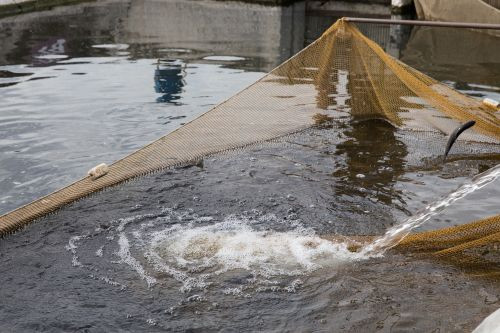AquaCycle: Reducing emissions in aquaculture through the sustainable use of effluent water and nutrients

The Interreg project ATCZ00002 - AquaCycle aims to reduce emissions in aquaculture, especially in recirculation systems. To achieve this goal, effluent water and nutrients are to be utilised efficiently.

Fish are a healthy source of nutrients for humans due to their essential fatty acids, proteins and minerals. Fish production in aquaculture makes an important contribution to protecting fish stocks in lakes and oceans from overfishing. In Central Europe, it is mainly SMEs that are active in fish production. Established here (especially in the Waldviertel and South Bohemia programme regions) are mainly pond and canal systems that require a lot of water, which is becoming an increasingly scarce resource due to climate change. In Austria, the self-sufficiency rate for fish is only 7% and urgently needs to be increased, as called for in European and national strategic documents (e.g. European Green Deal, aquaculture guidelines, Smart Specialisation RIS3). Recirculating aquaculture systems (RAS) are a sustainable and water-saving option for increasing fish production in aquacultures. RAS are space-efficient closed systems. They are flexible in terms of location - which can be chosen to minimise transport distances - and the type of fish produced - which has a positive effect on the diversity of fish produced in the region. Fresh water is saved by recycling parts of the discharge water, which also protects open waters. However, some of the run-off water is always discharged together with solid residues (e.g. faeces, feed residues), which means that valuable nutrients are lost and wastewater treatment plants are polluted. In Europe, as well as in Austria and especially in the Waldviertel region, the number of such systems is constantly increasing. The aim is to continue this growth. However, expanding and switching to RAS is a major hurdle for SMEs due to high investment and operating costs.
The aim of the "AquaCycle" project is therefore to increase the efficiency of recirculation systems in order to make them more attractive for SMEs and thus strengthen the aquaculture sector in the programme regions. To this end, the methods developed here for solid-liquid separation of the sludge produced are used to design and test concepts for the utilisation of both fractions (liquid, solids). In this way, valuable products are obtained - which are used in fish production - and waste is avoided at the same time. As a result, plant operators not only save costs for the disposal of residual materials, but also generate profits through their valorisation.
The overarching output of the project is a catalogue of measures that includes options for using the residues from recirculation systems, which are to be used by aquaculture stakeholders, adapted to the respective operation.
Projektvolumen
EUR 692.514,56
Start of project
2024-05-01 (ongoing)
Supported by
Interreg (European Regional Development Fund) - Interreg V-A Programme for cross-border cooperation between Austria and the Czech Republic 2021-2027 Interreg (Europäischer Fonds für regionale Entwicklung) - Interreg V-A Programm für grenzüberschreitende Zusammenarbeit zwischen Österreich und der Tschechischen Republik 2021-2027
Projektpartner
- Südböhmische Universität in Budweis (University of South Bohemia České Budějovice)
- Bundesamt für Wasserwirtschaft (The Federal Agency for Water Management)
- University of South Bohemia České Budějovice
- The Federal Agency for Water Management


Contact

Lisa BAUER
lisa.bauer@best-research.eu
Area Management

Bernhard DROSG
bernhard.drosg@best-research.eu